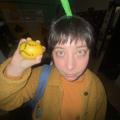Joerg reviewed A Half-Built Garden by Ruthanna Emrys
Gets in its own way
3 stars
This was a hard rating to find. In its best moments, this book is brilliant and deeply moving and cute and funny. But unfortunately, it is for the most part idea driven, and while a lot of those ideas are good and important to be in SciFi, they also make most of the narrative very tedious and wooden. I was still going for 4 stars, but then realized my biggest qualm: People place Emrys as the new LeGuin, but she most emphatically is not. LeGuin presented her ideas and then immediately let the story break them and show what could go wrong. And though Emry's idea of eco-anarchist communities moderated by clever technology is fantastic, she puts it on a pedestal and breaks narrative integrity to keep it squeaky clean. Also, the glorification of religious nonsense is almost grotesque in comparison to the embrace of diversity and standing up to …
This was a hard rating to find. In its best moments, this book is brilliant and deeply moving and cute and funny. But unfortunately, it is for the most part idea driven, and while a lot of those ideas are good and important to be in SciFi, they also make most of the narrative very tedious and wooden. I was still going for 4 stars, but then realized my biggest qualm: People place Emrys as the new LeGuin, but she most emphatically is not. LeGuin presented her ideas and then immediately let the story break them and show what could go wrong. And though Emry's idea of eco-anarchist communities moderated by clever technology is fantastic, she puts it on a pedestal and breaks narrative integrity to keep it squeaky clean. Also, the glorification of religious nonsense is almost grotesque in comparison to the embrace of diversity and standing up to power and control the rest of the book presents.















